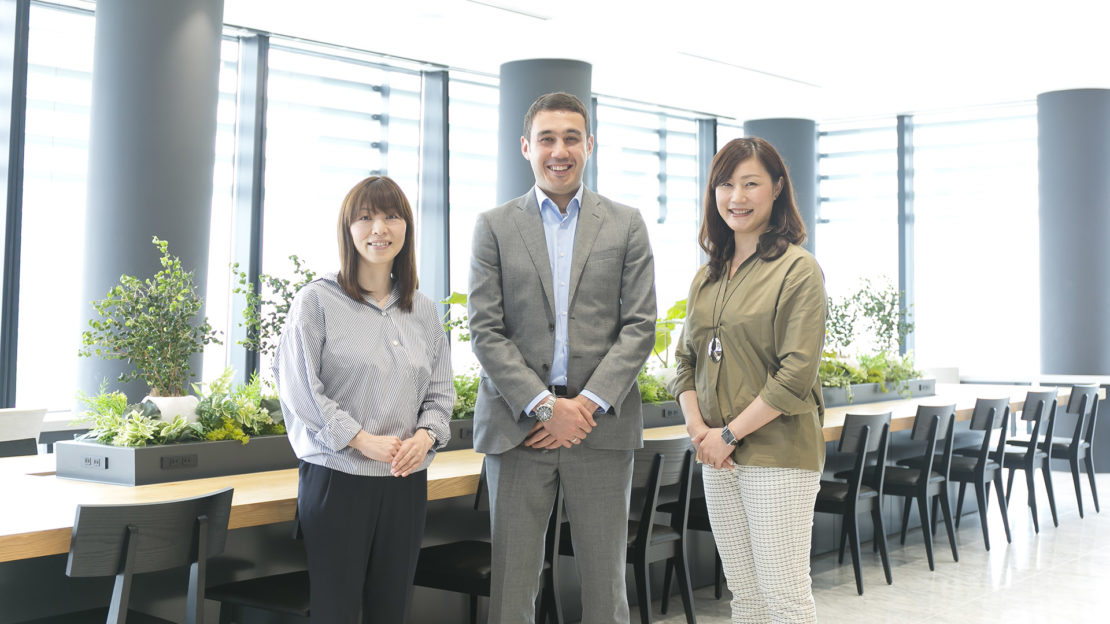Yanmar is now providing “Muslim-friendly” cuisine at the head office cafeteria.Employees leading the project talk about their efforts.
From March 1, 2016, Yanmar commenced serving a “Muslim-friendly” menu at its head office cafeteria, the Premium March Cafe, as part of its efforts to cater to Muslim employees and visitors adhering to the Islamic faith.
Additionally, Yanmar also allocated a specific purpose prayer room.
The worldwide growing Muslim population has opened up increasing opportunities for inter-relations across the cultures including visits by and employment of Muslim people.
As a company it has become increasingly important to consider ways to adequately accommodate people who adhere to such belief systems.
We spoke with the three core members carrying forward the project; Shohruhbek Ibragimov of the Marketing Strategy, Nozomi Yoshioka of the General Affairs Division and Tae Funakoshi of the Organization Development Office, to get a better insight into the background and details behind Yanmar’s “Muslim-friendly” initiatives.
Interviewees
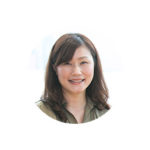 Tae Funakoshi,
Tae Funakoshi,
Organization Development Office,
Human Resources,
General Affairs & Legal Unit
 Nozomi Yoshioka,
Nozomi Yoshioka,
General Affairs Division,
Human Resources,
General Affairs & Legal Unit
 Shohruhbek Ibragimov,
Shohruhbek Ibragimov,
Marketing Strategy,
Corporate Strategy Division
Understanding Differing Social Practices at Lunchtime

Presently, approximately one quarter of the world’s population identify themselves as Muslim, with numbers expected to increase throughout the Asian region in particular.
In observance of Sharia law Muslim people must refrain from consuming pork, pork by-products, alcohol and any food or drink products which have not been classified as lawful (halal) by Sharia law, in addition to praying 5 times throughout the day at pre-dawn, midday, afternoon, dusk and in the evening.
Despite these facts, in Japan there is still a limited understanding and consideration of such religious practices and needs.
When Shohruhbek commenced employment at Yanmar in 2011, as a Muslim in Japan he had to come up with alternative ways to eat and find a place to pray.
 Shohruhbek: “There are about 5 or 6 restaurants that serve meals which Muslims are permitted to eat, within a 10-20 minute walk from the head office.
Shohruhbek: “There are about 5 or 6 restaurants that serve meals which Muslims are permitted to eat, within a 10-20 minute walk from the head office.
However that meant 20 minutes there and back, which left me only 10 minutes to eat lunch. There was no time to actually taste the flavors or enjoy the meal.”
When Shohruhbek began working at Yanmar, while he was given allowances to pray two to three times during the working hours, he had to make do with meeting rooms which were not in use or alternatively use the area by the emergency evacuation stairs.
“It was difficult to relax as I was never sure when someone was going to walk past,” said Shohruhbek.
In November 2011, the new head office building, the Yanmar Flying-Y Building was completed.
And the Premium Marche Cafe on the 12th floor was opened for service.
With grilled fish available on the menu Shohruhbek was able to eat at the cafeteria, however eating fish every single day was not quite ideal either.
He spoke with Nozomi Yoshioka about the possibility of introducing meals that were suitable for Muslim people into the cafeteria’s selection.
At the time the answer was to please wait and be patient.
 Nozomi: “Having just opened the cafeteria there were still a lot of issues that needed to be smoothed out to ensure successful operations.
Nozomi: “Having just opened the cafeteria there were still a lot of issues that needed to be smoothed out to ensure successful operations.
Serving even just one halal meal required a lot of planning and preparation so we needed a little bit more time.”
One year later, in autumn of 2015.
Shohruhbek was seated near the person overseeing cultural diversity in Yanmar; Tae Funakoshi of the Organization Development Office. During conversation Shohruhbek put forth his proposal once again.
Tae agreed that as a diversifying and global company, Yanmar should also be adopting a more diverse approach in terms of the food it offers. He spoke later with Nozomi.
The Premium March Cafe was operating smoothly and Nozomi was pleased to see that Shohruhbek’s proposal was finally being pushed forward.
 Nozomi: “Meeting Shohruhbek in the cafeteria was the big starting point for the project. I could see that he was ordering according to what he was permitted to eat rather than by preference.
Nozomi: “Meeting Shohruhbek in the cafeteria was the big starting point for the project. I could see that he was ordering according to what he was permitted to eat rather than by preference.
Valuing food and nutrition is at the core of Yanmar’s mission.
Our vision was to create a cafeteria that people want to eat at every day and the fact that we weren’t achieving that in Shohruhbek’s case was something that I felt needed to be addressed.”
The Premium Marche Cafe offers healthy and delicious food and in endeavoring to ensure that the food served was made available to everyone, Nozomi turned her focus towards creating “Muslim-friendly” alternatives.
Defining a Standard for Yanmar’s “Muslim-friendly”
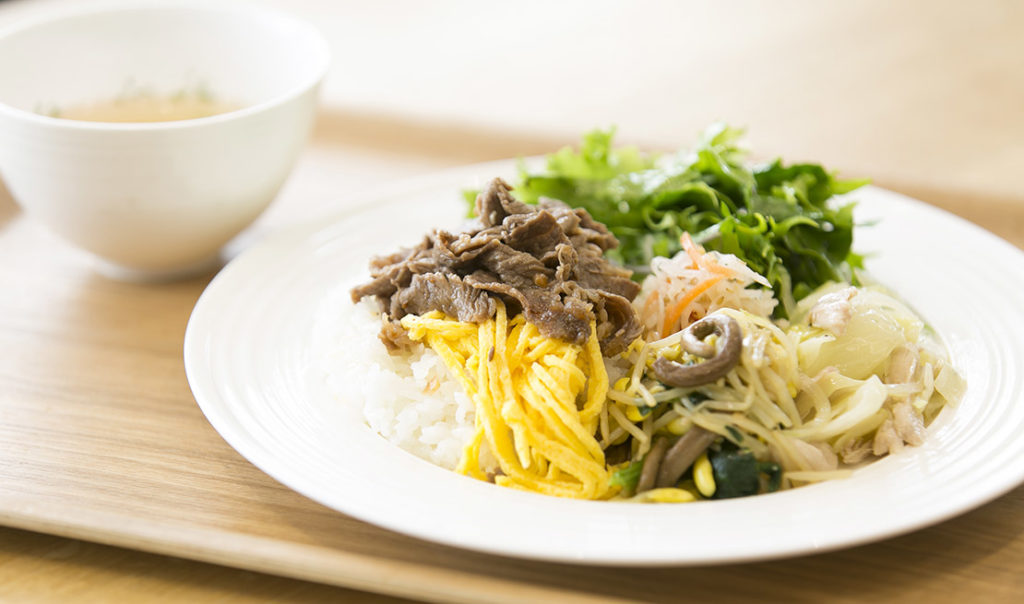
With sales outlets all over the globe, Yanmar embraces a progressive global approach.
While the “Muslim-friendly” menu began with Shohruhbek’s proposal, Yanmar’s decision came from the recognition of an expected increase in inter-relations with Muslim people and the growing need to incorporate the cultural needs of others.
The three project members held meetings almost every week.
The very first step was to gain fundamental knowledge into the culture and determine what accommodations needed to be put in place.
Nozomi, Tae and Shohruhbek held discussions as well as actively attending seminars outside of the company.
They discussed what considerations were necessary, catering and operational methods, and what Yanmar could do to accommodate these needs.
Initially they considered the option of organizing halal lunch sets to be delivered.
However, when they trialed the delivery lunches, while the taste was adequate there was a very small selection to choose from.
There were also some operational issues in terms of order placement and who would make the orders.
The three employees then made visits to other companies to observe their operations and cuisine on offer.
In the majority of cases, companies were serving packaged microwaved meals.
Determined to uphold the Premium Marche Cafe’s principle of serving fresh and healthy food, they decided against the packaged food option and went with the option to cook Halal meals on the premises just as they did with the other meals.
 Shohruhbek: “I was quite surprised at Nozomi’s response. I would have been happy to have a lunch set delivered.
Shohruhbek: “I was quite surprised at Nozomi’s response. I would have been happy to have a lunch set delivered.
In order to serve food that completely adheres to halal standards, Yanmar would have to install a special halal kitchen.
Even without doing this, coming up with a defined “Muslim-friendly” menu that Yanmar could provide which satisfied the needs of our employees and visitors proved to be a bigger endeavor than I had first expected.”
‘Muslim-friendly’ has a very broad definition so it was necessary for Yanmar to set its own standard.
The term “Muslim-friendly” has a very broad definition and therefore it was necessary for Yanmar to set its own defined standard.
Furthermore, it required further collaboration with the catering company running the Premium Marche cafe.
Nozomi began negotiating to determine to what extent it was possible to cater to the requirements of halal cuisine.
 Nozomi: “When it comes to meals for Muslim people, we needed to come to a shared understanding of what areas required consideration, to what degree these areas required consideration, and then to ensure that the catering company was also aware of these needs.
Nozomi: “When it comes to meals for Muslim people, we needed to come to a shared understanding of what areas required consideration, to what degree these areas required consideration, and then to ensure that the catering company was also aware of these needs.
When learning about the religious precepts surrounding food I was most surprised by the rules regarding cooking utensils and tableware.”
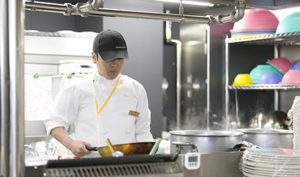 For example, if a halal product came into contact with a plate or cooking utensil which had touched pork or non-halal products then it was no longer considered halal.
For example, if a halal product came into contact with a plate or cooking utensil which had touched pork or non-halal products then it was no longer considered halal.
For Muslim people, unless the food is served using plates and utensils that are used separately from regular meals, they would be eating with the anxiety of not knowing whether the food they are eating is in fact permissible by their religion.
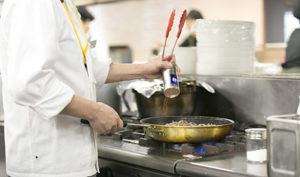 The project members investigated each point against the laws of Islam and the explanations by Shohruhbek, continually making adjustments to their proposal along the way until they finally decided on the following definition.
The project members investigated each point against the laws of Islam and the explanations by Shohruhbek, continually making adjustments to their proposal along the way until they finally decided on the following definition.
<The Definition of Yanmar’s “Muslim-friendly” Menu>
● Does not include any pork meat, pork products or alcohol(antiseptics may include alcohol)
● All meat for consumption is halal certified
● Additives are halal certified in the majority of cases. In the case where a product is not certified, the ingredients have been checked to ensure that it does not contain any ingredients that are not permissible (halal).
● Cooking utensils and tableware utilized for cooking the meals are all cleaned and stored separately from other utensils and tableware which are used for cooking non-halal foods

“Muslim-friendly” meals are prepared and cooked at a different time to regular meals, observing the rule of not preparing food next to non-halal foods.
However, as of May 2016 due to the added cleaning and preparation involved at present Yanmar is only able to offer 20 meals per day.
With the menu in effect Yanmar employees and overseas visitors could be rest assured that they can enjoy “Muslim-friendly” meals.
Diversity that Begins with Good Food
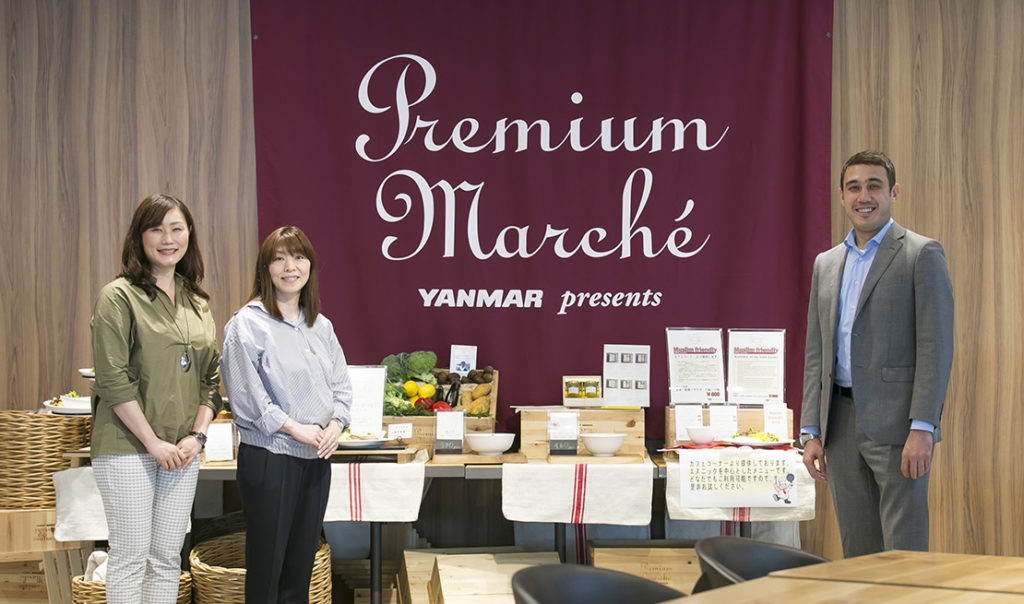
Through commencing the “Muslim-friendly” menu Nozomi and Tae both had many experiences trialling halal food, both of them expressing their pleasant surprise as to the appealing flavors and healthiness of the cuisines.
 Tae: “Mutual understanding between all employees and awareness that a diverse range of people with different needs exist is an essential perspective.
Tae: “Mutual understanding between all employees and awareness that a diverse range of people with different needs exist is an essential perspective.
Even if we come from different cultural backgrounds, trying and discussing new things cultivates mutual interests in the other person’s culture, leading to mutual-understandings.
As our other employees are able to enjoy the meals also, it provides further opportunity to broaden cultural awareness and understanding. This is one part of what we were striving for with this project.”
After commencement of the “Muslim-friendly” menu, Nozomi went every day to check in and talk things over with the catering company.
In line with Tae’s previous conversation, they made further improvements to the speed of service and expanded the menu in order to integrate it.
 Nozomi: “The preparation and serving of “Muslim-friendly” meals was different from other foods and therefore it was time-consuming.
Nozomi: “The preparation and serving of “Muslim-friendly” meals was different from other foods and therefore it was time-consuming.
If it takes too long, then consumers end up ordering something else. So we began discussing and devising ways in which to serve hot, delicious and prompt meals”.
 Tae: “Many people asked if the “Muslim-friendly” was food only for Muslims.
Tae: “Many people asked if the “Muslim-friendly” was food only for Muslims.
We discussed how we could promote cultural understanding through enjoying food from other cultures, and from there we devised a menu of dishes from various different countries which had a large Muslim population.
By presenting the food in a way that people could easily understand we were able to get a lot of positive feedback”.
Nowadays, the menu is sometimes sold out with Shohruhbek himself potentially missing out.
As a member of the project, Shohruhbek was extremely pleased with this outcome.
 Shohruhbek: “Yanmar is a pioneer in the sense of a large company showing so much initiative to accommodate to the needs of Muslims.
Shohruhbek: “Yanmar is a pioneer in the sense of a large company showing so much initiative to accommodate to the needs of Muslims.
The “Muslim-friendly” menu opened up opportunity for more cultural understanding and interactions to form organically.
People have become more accustomed to the need to be conscious of and to ask overseas customers of their eating preferences or needs”.
Seeing the “Muslim-friendly” menu being served each day, is a testament to the global consciousness and rising level of the hospitality provided by Yanmar’s employees.
The other day customers visiting from Indonesia who requested the “Muslim-friendly” menu for both lunch and dinner, were quite impressed with the flavor.
Taking Ownership and Making It Your Mission Global Diversification from the Bottom-up
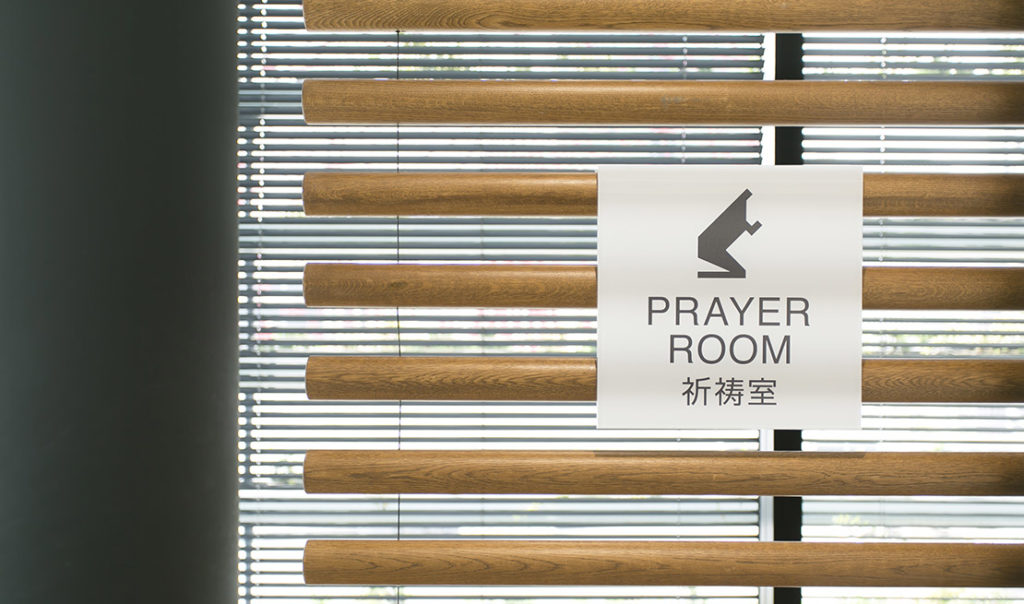
At the same time as implementing the “Muslim-friendly” menu we also designated a special-purpose prayer room where Muslims can pray in peace and at ease.
 Tae: “Our recent studies into Islamic customs brought to attention the fact that prayer is equally of high importance to followers of the Islamic faith.
Tae: “Our recent studies into Islamic customs brought to attention the fact that prayer is equally of high importance to followers of the Islamic faith.
Of course there were a number of issues that needed to be addressed such as the location, however management was supportive throughout the entire process.”
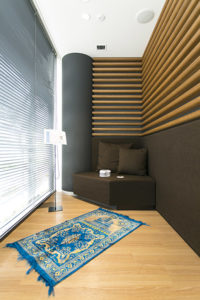 The initial proposal was to make the prayer room nearby work areas on the 6th floor, however after considering the custom of praying after lunch in addition to providing access for visitors, the 12th floor where the Premium Marche Cafe is proved to be the better option.
The initial proposal was to make the prayer room nearby work areas on the 6th floor, however after considering the custom of praying after lunch in addition to providing access for visitors, the 12th floor where the Premium Marche Cafe is proved to be the better option.
Unlike the work areas and meeting rooms, there were not many passersby and the area could be sectioned off to signal that someone was in prayer.
In all, the location offered peace and quiet for praying.
Speaking with the 3 persons leading the project here today has further highlighted the bottom up approach of the initiative which started with just one employee.
From there over 10 employees in Yanmar voluntarily joined the initiative together with the catering company.
Tae’s efforts are a significant exemplification of Yanmar’s guiding principles “work together and remove internal barriers,” and “encourage differing views and not just follow consensus” being realized in action.
 Tae: “Taking ownership and considering others.
Tae: “Taking ownership and considering others.
That is the starting point for global diversification and coming together.
Just like with this project, I hope to see new habits and customs grow organically”.
The Yanmar Flying-Y Building itself acts as a facility for promotion of our Brand Statement, “A Sustainable Future”.
Therefore it holds a lot of significance for Yanmar and its aspirations of deepening global diversification and unification.
 Nozomi: Muslim culture through our cafeteria menu is just one example of how we can actualize our mission statement “to provide sustainable solutions in food production and harnessing power, thereby enriching people’s lives for all our tomorrows.”
Nozomi: Muslim culture through our cafeteria menu is just one example of how we can actualize our mission statement “to provide sustainable solutions in food production and harnessing power, thereby enriching people’s lives for all our tomorrows.”
A project that began with just one person and was led by the principles which underpin Yanmar’s mission statement.
By bringing people of various backgrounds within one organization together through sharing cultural customs and eating practices we can deepen mutual understanding.
And, such developments lead to placing more value on people and food, resulting in new possibilities.

 Agriculture
Agriculture
 Recreational Marine
Recreational Marine
 Recreational Boat
Recreational Boat
 Premium Cruiser
Premium Cruiser
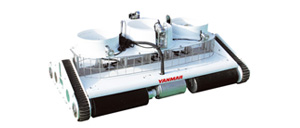 Marine Equipment
Marine Equipment
 Marine Commercial
Marine Commercial
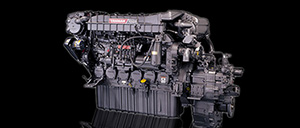 Propulsion Engines (High Speed)
Propulsion Engines (High Speed)
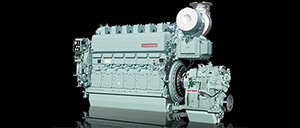 Propulsion Engines (Medium Speed)
Propulsion Engines (Medium Speed)
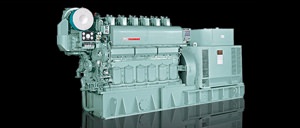 Auxiliary Engines
Auxiliary Engines
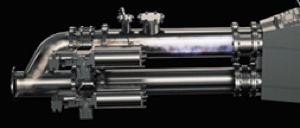 SCR System
SCR System
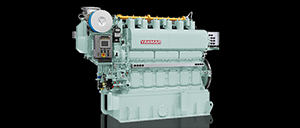 Dual Fuel Engine
Dual Fuel Engine
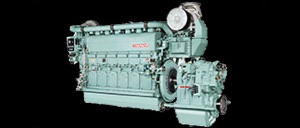 Two-stage Turbocharging System
Two-stage Turbocharging System
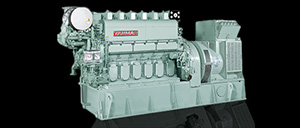 Electric Propulsion System
Electric Propulsion System
 Energy Systems
Energy Systems
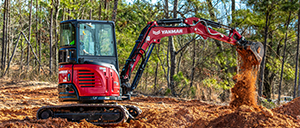 Construction
Construction
 Industrial Engine
Industrial Engine
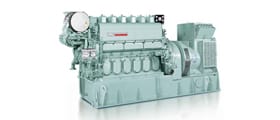 Large Generators
Large Generators
 Power Products
Power Products






















